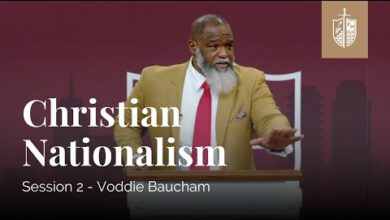The Strength Of Our Confession | Voddie Baucham
The Strength Of Our Confession | Voddie Baucham
In tonight’s assignment, we will explore Matthew 16:13-20, focusing on the authority of our confession. Many people view the church as just another organization, but we know it is unique. The question is: what makes the church unique and what grants it its authority?
We gather together, sing, proclaim truth, have membership, and perform ceremonies. But none of these elements make us unique. People gather in stadiums, exhibit immense religious fervor, and cheer for their favorite teams. They attend concerts and sing until they lose their voices. People also go to TED Talks, conferences, and university lectures to hear truth proclaimed. These activities, while meaningful, are not exclusive to the church.
Ceremonies are not what set us apart either. Many institutions have ceremonies: universities hold graduations, and politicians undergo swearing-in ceremonies. But these practices don’t define the church’s uniqueness.
So, what truly makes the church unique? What gives the church authority? What makes it more significant than other institutions? Peter answers this question in 1 Peter 2:9-10: “But you are a chosen race, a royal priesthood, a holy nation, a people for His own possession, that you may proclaim the excellencies of Him who called you out of darkness into His marvelous light. Once you were not a people, but now you are God’s people. Once you had not received mercy, but now you have received mercy.”
How does this happen? How do we become this royal priesthood and a nation without borders or armies? How are we declared God’s people? Who gives us the right to make such bold declarations? Our text tonight provides the answer.
In Matthew 16:13-14, we see the importance of accurately confessing the truth. When Jesus entered the district of Caesarea Philippi, He asked His disciples, “Who do people say the Son of Man is?” They replied, “Some say John the Baptist, others say Elijah, and others say Jeremiah or one of the prophets.”
It’s interesting that they didn’t mention more negative or opposing views, such as calling Jesus Beelzebub (which would have been accurate in some contexts). Instead, they spoke of those who believed Jesus was someone significant, perhaps even supernatural. These were people who were trying to interpret Scripture and understand who Jesus was. They thought Jesus might be a forerunner of the Messiah or one of the prophets.
However, these beliefs were insufficient. If Jesus were simply a prophet or a forerunner, He would not have the authority to declare us a royal priesthood, a holy nation, or God’s people. Just as today, people may think highly of Jesus, with some believing He was a prophet, but this view doesn’t give Jesus the authority that is needed to establish the church’s unique identity and authority.
Key Takeaways:
- The authority of our confession depends on the accuracy of what we confess.
- What makes the church unique isn’t rituals, gatherings, or ceremonies; it’s the truth we confess about Jesus.
- Our authority comes from being chosen by God as His people, a royal priesthood, and a holy nation.
This passage reminds us that our identity and authority as a church are rooted in the truth of who Jesus is and what He has done for us.
